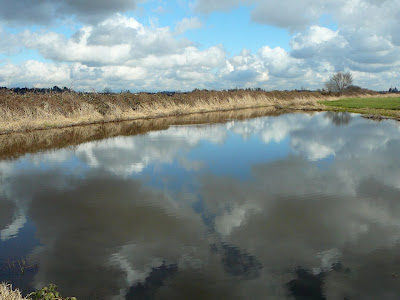 |
| "Praise the Lord from the earth, You ... clouds" - Psalm 148:7-8 |
TODAY'S SPECIAL: Psalm 148:1-14
TO CHEW ON: "Let them praise the name of the Lord,
For His name alone is exalted;
His glory is above the earth and heaven." - Psalm 148:13
Where do you see God's glory? What brings praise to your lips? The psalmist sees God's praiseworthiness everywhere.
Heaven: He directs the hosts of angels and heavenly bodies to pour out praise (Psalm 148:1-4).
Nature: He sees praise emanating from the natural world— from the sea creatures in the ocean depths to the weather ("fire and hail, snow and clouds"), from geography ("mountains and all hills") to all living things (plants, beasts, creeping critters and flying fowls) (Psalm 148:5-10).
People: He admonishes all people on earth—from kings to judges, from young to old of both men and women to praise the LORD (Psalm 148:11-13).
I ask myself, do I see God as praiseworthy in all those places? Yes, His power and ability to create the visually beautiful in scene, the mind-bendingly incredible in design inspires my worship for sure. But do I also praise and worship when I don't understand? When 'acts of God' bring human lives into shambles, when earth's inhabitants seem to be entirely out of His control?
The psalmist ends with a reason to praise: "He has exalted the horn of His people" - Psalm 148:14.
I would suggest that that is also my reason, our reason, to praise. For He will work all the apparent chaos (in nature and among people) into a final picture that will make sense and show Him to be the just, holy, righteous, loving God He claims to be (Revelation 15:3-4; 21:23-27; 22:12-15).
PRAYER: Dear God, how my perspective changes when I recognize that Your fingerprints are on every created thing and that You are never absent from the affairs of nature or people. Help me to see life through the lens of Your immanence. Amen.
MORE: God's transcendance, immanence and pantheism
When we consider God and creation, we need to keep several concepts in mind:
1. God is separate from and much greater than creation. The word used to describe this is transcendent. Wayne Grudem explains the word in his Systematic Theology:
"Very simply, this means that God is far 'above' the creation in the sense that he is greater than the creation and he is independent of it" p. 267.
2. God is also involved in creation. we say He is immanent or "remaining in" creation. Grudem again:
"The God of the Bible is no abstract deity removed from, and uninterested in his creation. The Bible is the story of God's involvement with his creation, and particularly the people in it" - Ibid.
3. However, God is not equal to creation—what we call pantheism.
"The scriptural account of God's relation to his creation is also distinct from pantheism. The Greek word pan means 'all' or 'every,' and pantheism is the idea that everything, the whole universe, is God, or is part of God." - Grudem, p. 268.
***********
The Holy Bible, New King James Version Copyright © 1982 by Thomas Nelson, Inc. - Used with permission.
No comments:
Post a Comment